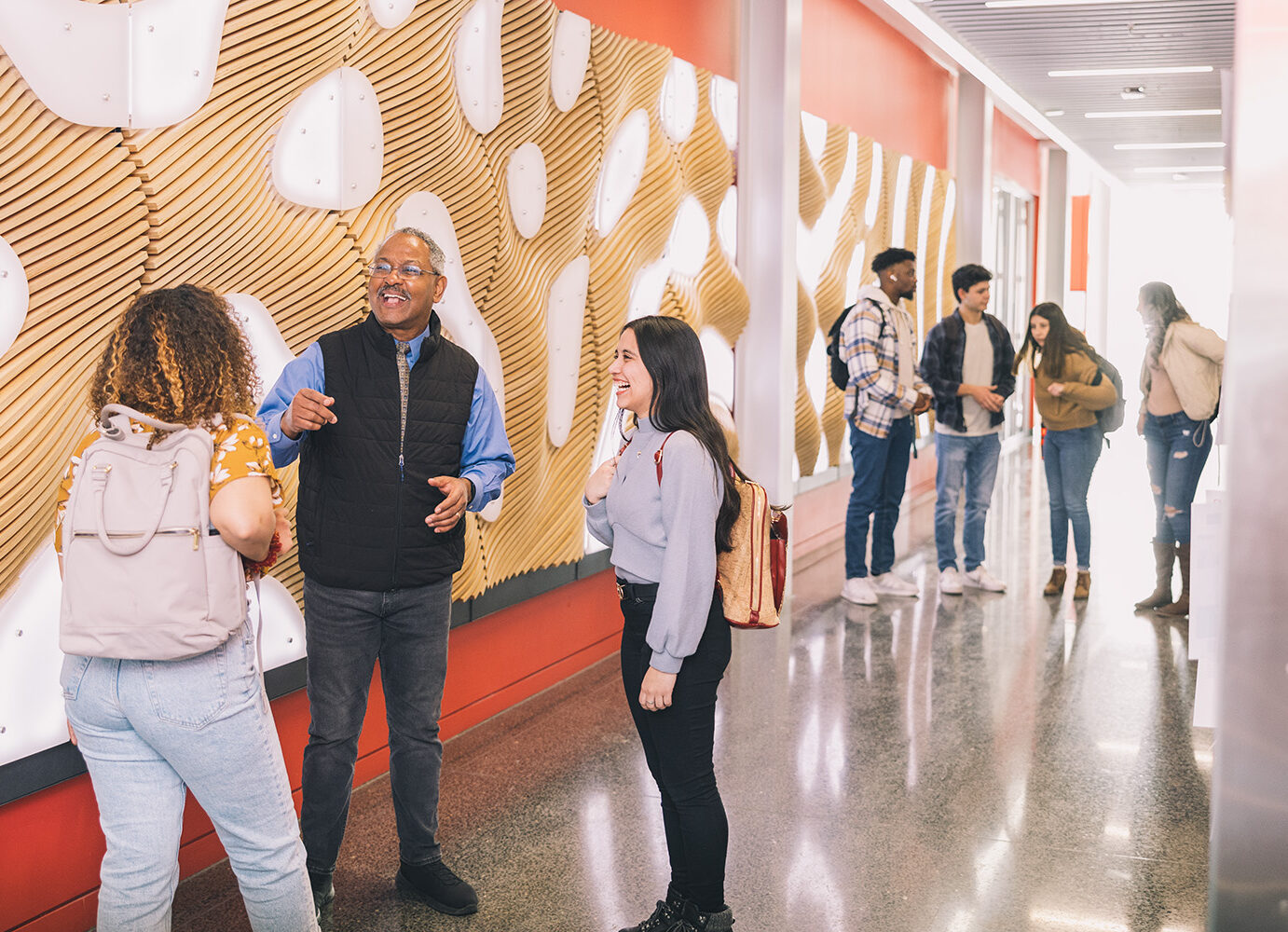
About the Pitch Competition
We want to hear from you! Submit your ideas, projects, or novel concepts for consideration by a panel of reviewers. Projects selected for funding will create new resources, services, workshops, courses or more, to add to the ASN’s offerings.
We welcome innovative ideas from organizations, institutions, and individual practitioners with demonstrated successful experience working on projects related to holistic advising redesign. Share your thoughts about what you believe the field needs and tell us about the innovative, student-centered resources you would create for ASN’s primary audience: postsecondary institutions undergoing holistic advising redesign efforts to increase completion and success indicators for students, including Black, Latinx/a/o, Indigenous, Asian, and Pacific Islander, and poverty-affected students.
The ASN and our team of advising leaders seek innovative pitch ideas that could be implemented or disseminated by the ASN to achieve one or both objectives:
- Expand or add dimension to the ASN Evidence Base for Holistic Advising Redesign through research or by strengthening the ASN Theory of Change (e.g., case studies, student experience research, etc.)
- Lead to the development and/or delivery of innovative new professional development services, toolkits, and/or other resources that enable ASN to better support institutional Holistic Advising Redesign Efforts (e.g. coaching, peer mentoring, etc.)
Priority Topics for Funding Submissions
In focus groups and collaborative projects with students and practitioners, the following themes have continued to persist as needs. We are particularly interested in pitches focused on these areas:
Practical approaches to incorporate AI technologies, allowing advisors and students to better utilize their time together for more substantive discussions.
Examples include:
- automating routine tasks such as scheduling, answering frequently asked questions, and tracking progress
Integrating labor market data to provide meaningful support to students, parents, and families in career exploration and coaching.
Examples include:
- programs that incorporate mentorship, personal growth, skill development, reflection on goals, and career aspirations
Higher education systems change for racial and socioeconomic justice requires a systemic, cross-sector approach.
Examples include:
- partnerships between and across K-12, community based organizations, postsecondary, and/or workforce/employers that promote a culture of care and advance success for the ASN’s priority student populations
Institutional approaches to advisor recruitment and retention, as well as the creation of a culture of care and professional growth.
Examples include:
- creating career ladders and other recognition and support efforts
How the institution implements and integrates student-centered supports that engage each student as a whole person and works to meet their academic and personal needs.
Examples include:
- implementing culturally responsive pedagogies; providing mental health support services; assessing student experience and learning outcomes
Peer advising is a student-centered approach that leverages the expertise and experiences of trained student advisors to support their peers.
Examples include:
- developing programs that position students as leaders and experts in a variety of focus areas, such as personal, academic, financial, and career
How the institutional community works with students to learn about their lived experience and shape its advising supports to respond to the cultural norms and needs of diverse student populations.
Examples include:
- gathering and incorporating student voice and feedback across a wide variety of students to identify and address structures, policies, and processes that do not align with students’ values and needs; developing accessible and safe opportunities for students and staff to report incidents of bias

Eligibility and Amount of Funding Requested
The ASN encourages applications from individuals, small business entities (e.g. sole proprietorships and LLCs), research institutions, institutions of higher education, and nonprofit organizations.* If you are unsure if you qualify for this opportunity, please feel free to contact us at [email protected] to inquire.
Funding amounts will be determined after careful consideration of the project and scope of work (SOW) proposed during the second stage of the pitch competition. Prior similar project awards have typically ranged between $5,000.00 to $20,000.00.
*Please note that you may submit more than one project.
Timeline for the Pitch Competition
- Round 1:
- Applicants complete the information form and submit a brief pitch for consideration.*
- Pitches will be reviewed on a rolling basis.
- Round 2:
- Semi-finalists invited to move forward to the next round will be informed via email.
- Semi-finalists will be required to submit a full proposal with additional supporting documents and scope of work by a date as noted in the email.
- Semi-finalists indicate scheduling preferences for available times, should they be selected for a live pitch session.
- Round 3:
- Finalists will be scheduled for a 15-minute appointment (five-minute pitch of their proposal; up to 10-minute Q&A) in front of a live (virtual) audience including student panelists, ASN team, and other reviewers.
- Preliminary selection notifications will be sent out promptly following consideration of the pitch.
- Selection and Contracting:
- MOUs will be executed with selected recipients promptly following selection notifications.
- Project contracts will stipulate a completion date based on the timeline when proposal is submitted.
- All funded projects will undergo an equity review as a last step in the finalization process and may require editing to adjust based on feedback from that process.
*The ASN will accept Round 1 pitches in any format, however video submissions are limited to 4 minutes in length, and written submissions are limited to 500 words). Review of received proposals will continue until all funds have been allocated.
Criteria for Submission Evaluation
The ASN Pitch Competition Advisory Committee will review and evaluate proposals based on the following criteria:
Alignment with ASN Priorities and Impact on Identified Needs
- How well does this proposal align with ASN’s holistic advising redesign recommendations?
- How well does this proposal align with ASN’s priority topic(s)?
- What evidence is there that this project expands and builds upon existing research and resources in the field?
- What evidence is there that this proposal will successfully incorporate the student voice?
Impact on Students
- Does this submission focus on addressing institutionally-imposed barriers to student success for the ASN’s priority student populations?
- Does this project clearly articulate the ways in which the project activities and outcome will impact completion and success indicators for one or more of ASN’s priority student populations (Black, Latinx/a/o, Indigenous, Asian, and Pacific Islander, and poverty-affected students)?
- Does the project team or partners include students enrolled in Tribal Colleges and Universities (TCUs), Historically Black Colleges and Universities (HBCUs), Historically Black Community Colleges (HBCCs), Predominantly Black Institutions (PBIs), Asian American, Native American, Pacific Islander-serving institutions (AANAPISIs), and/or Hispanic Serving Institutions (HSIs)?
Innovation and Originality
- Does this project expand or add new dimensions to the Evidence Base for Holistic Advising Redesign or offer innovative new services or resources that support institutional Holistic Advising Redesign efforts?
- Does this project deliver content to students and/or practitioners in a novel or original way?
Project Feasibility
- What problems/needs does this project seek to mitigate and is the proposed team and solution well positioned to address it?
- How well does the project goal and objectives match the budget, timeline, and scope as outlined in the proposal materials?
- Does the proposed budget realistically and sufficiently support all planned project activities?

Resources to Submit Your Pitch and Interest Form:
Important Information & Disclosures
- Funding amounts will be determined after careful consideration of the projects proposed. Prior funded project awards have ranged between $5,000.00 to $20,000.00 and resulted in final products such as case studies, virtual and/or in-person workshops, research, or toolkits. You may include a section in your pitch about the funding request for your proposal.
- Applicants whose pitches are funded agree that all research and deliverables generated using funding from the pitch competition will be considered “work for hire” and owned solely by NASPA. NASPA will retain full ownership and copyright of content funded by the pitch competition in perpetuity. Any substantive revisions, modifications, adaptations, or reproductions of content or other work for hire materials will require prior written approval from NASPA, as the intellectual property owner. The topic areas listed as particular interest in the pitch competition materials are considered needs of the field and NASPA will leverage these deliverable works to support institutions and/or make them open access to the public by being hosted on the ASN website.
- Applicants whose pitches are funded will complete a contract with NASPA that outlines deliverables and payment schedule. Payments will be made in multiple installments, as determined by the scope of the project, but can include one payment at the time of contract execution, and other payment(s) following completion of planned activities and/or submission of completed deliverables. Recipients will be expected to complete all planned activities and deliverables included in their scope of work by a date adjusted based on the timeline of when the proposal was submitted. All final projects will be submitted for an equity review and may require additional revision following the feedback from this process.
- Applicants will be asked to demonstrate experience implementing one or more of the ASN’s evidence-based holistic advising practices to enhance student success for students, including Black, Latinx/a/o, Indigenous, Asian, and Pacific Islander students, and poverty-affected students.
- Applicants whose pitches are selected for funding will be invited to engage as a virtual cohort for an added benefit to share about their work and connect with each other.

Examples of Related Prior Projects
The ASN welcomes ideas that are innovative as well as those similar to projects we have funded in the past. See below for some illustrative examples, including links to past funded projects:
Research projects reflecting lessons learned from multiple institutional types and sectors, including:
- Case studies
- Virtual courses for asynchronous learning
- Toolkits
- Student voice projects and research
- “How-To” guides or toolkits that leverage publicly available data and provide workable templates for institutions to customize and tailor to their needs.
- Draft student survey question banks
- Draft student focus group protocols
- Strategies for improving student engagement; gathering and incorporating student voice; identifying and addressing structures, policies, and processes that do not align with students’ values and needs
- Example student learning assessments beyond surveys
- Example data and indicators to track beyond traditional measures
Professional Development provided via virtual or in-person workshops for institutional audiences (such as ASN services) or other potential formats, including:
- Application of labor market data in advising interactions;
- Leveraging artificial intelligence in advising;
- Providing culturally responsive, affirming, and personalized supports for students;
- Translating advising practices and institutional culture to online environments;
- Strategies to engage students’ support systems, inclusive of families and community-based organizations;
- Developing peer mentorship/advising programs
- Advisor hiring: Diversifying application pools
- Leveraging community resources to meet students’ basic needs

Interested in learning more?
Contact: [email protected]
Amy Geist | Senior Director of Strategic Initiatives and Operations
NASPA
Lilly Lavner | Consultant
NASPA


